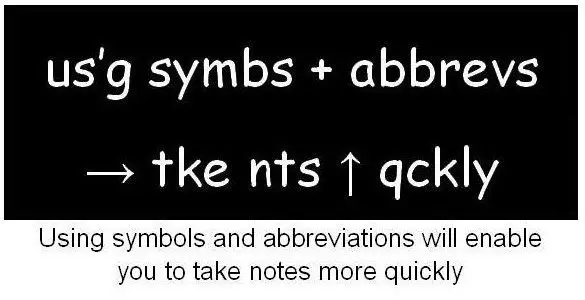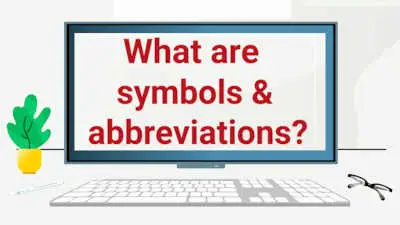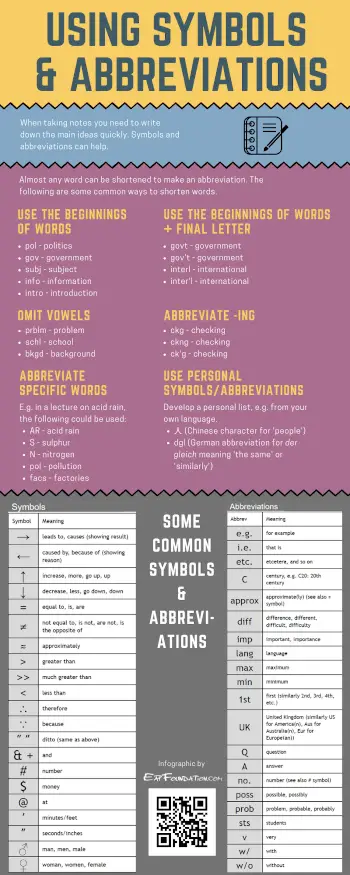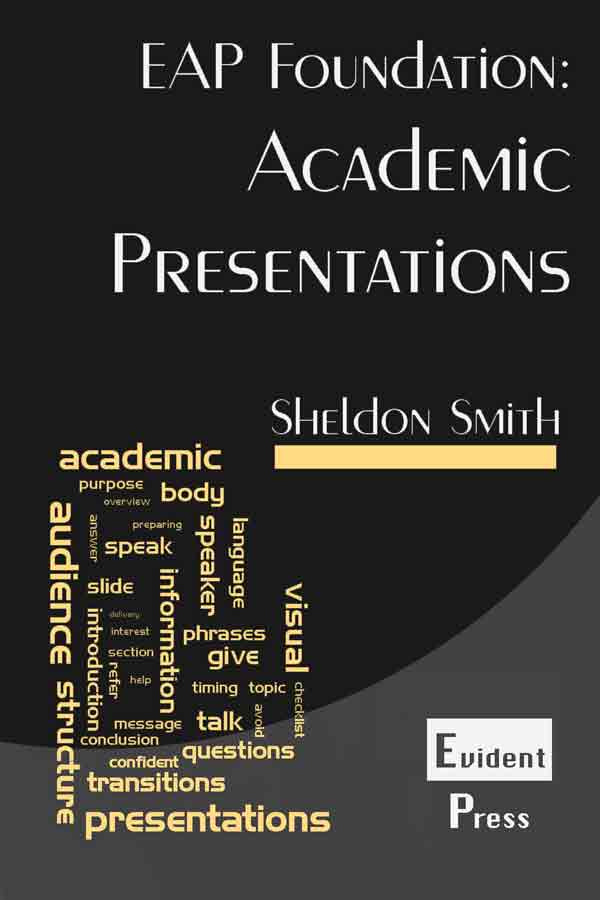Show AWL words on this page.
Show sorted lists of these words.


 







|
One of the most difficult aspects of taking notes during lectures is that you cannot both listen and write at the same time. When you stop to write down an idea, you might miss something else which is important. This means you need to find a way to write down the main ideas as quickly as you can, so that you can maximise the amount of time you spend listening. This is where symbols and abbreviations can help.
 Podcast is loading. Too slow? Click here to access.
Podcast is loading. Too slow? Click here to access.
On this page, you can find out:
- ways to abbreviate (shorten) any word
- some common abbreviations and symbols
- ideas to make your own personal abbreviations and symbols
Ways to abbreviate words
Almost any word can be shortened during note-taking. Below are some ideas about how to do this.
Use the beginnings of words
One way to shorten a word is to use just the beginning of the word, for example:
- pol - politics
- gov - government
- subj - subject
- info - information
- intro - introduction
Use the beginnings of words with the final letter

Sometimes it can be useful to add the final letter of the word. Some people prefer to also add an apostrophe ('), others don't. For example:
- govt - government
- gov't - government
- interl - international
- inter'l - international
Omit vowels
Sometimes you might need to write out the whole word, but even so, you can probably leave out the vowels and still understand the word, for example:
- prblm - problem
- schl - school
- bkgd - background
Abbreviate -ing
The ending -ing is very common, so find a way to abbreviate it, for example:
- ckg - checking
- ckng - checking
- ck'g - checking
Abbreviate specific words from the lecture
If there are words which are commonly used in a particular lecture you are listening to, you should try to abbreviate them. For example, in a lecture about acid rain, the speaker might frequently talk about sulphur, nitrogen, pollution, factories. The following abbreviations could be used:
- AR - acid rain
- S - sulphur
- N - nitrogen
- pol - pollution
- facs - factories
Common symbols & abbreviations
There are many common abbreviations and symbols which you can use for note-taking. You probably already know many of these (especially the mathematical symbols), but perhaps had not thought about using them before. Try to learn some of these and start using them when you take notes.
Symbols
| Symbol | Meaning |
| → | leads to, causes (showing result) |
| ← | caused by, because of (showing reason) |
| ↑ | increase, more, go up, up |
| ↓ | decrease, less, go down, down |
| = | equal to, is, are |
| ≠ | not equal to, is not, are not, is the opposite of |
| ≈ | approximately |
| > | greater than |
| >> | much greater than |
| < | less than |
| ∴ | therefore |
| ∵ | because |
| ″ ″ | ditto (same as above) |
| & + | and |
| # | number |
| $ | money |
| @ | at |
| ′ | minutes/feet |
| ″ | seconds/inches |
| ♂ | man, men, male |
| ♀ | woman, women, female |
Abbreviations
| Abbrev | Meaning |
| e.g. | for example |
| i.e. | that is |
| etc. | etcetera, and so on |
| C | century, e.g. C20: 20th century |
| approx | approximate(ly) (see also ≈ symbol) |
| diff | difference, different, difficult, difficulty |
| imp | important, importance |
| lang | language |
| max | maximum |
| min | minimum |
| 1st | first (similarly 2nd, 3rd, 4th, etc.) |
| UK | United Kingdom (similarly US for America(n), Aus for Australia(n), Eur for Europe(an)) |
| Q | question |
| A | answer |
| no. | number (see also # symbol) |
| poss | possible, possibly |
| prob | problem, probable, probably |
| sts | students |
| v | very |
| w/ | with |
| w/o | without |
Personal symbols & abbreviations
You should also try to develop your own list of personal abbreviations and symbols, which might use different rules from the ones above. Some might be suggested from your own language. One I particularly like is 人, the Chinese character for 'people', which is much quicker to write than any English abbreviation or symbol. I also use 'dgl' for 'the same' or 'similarly'; this is a German abbreviation (short for 'der gleich') which I learnt at university when studying mathematics.
Next section
Read more about different styles of notes in the next section.
Previous section
Read the previous article about note-taking basics.








